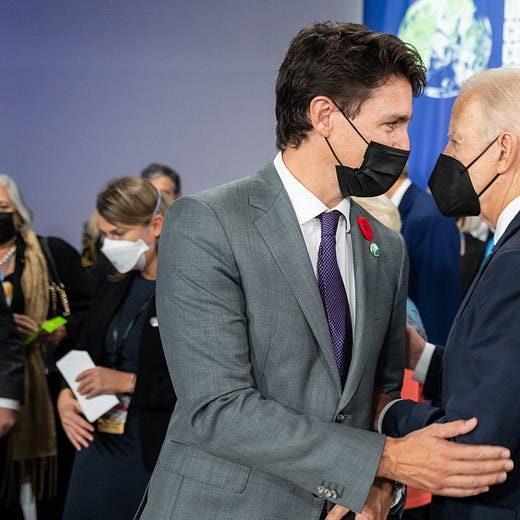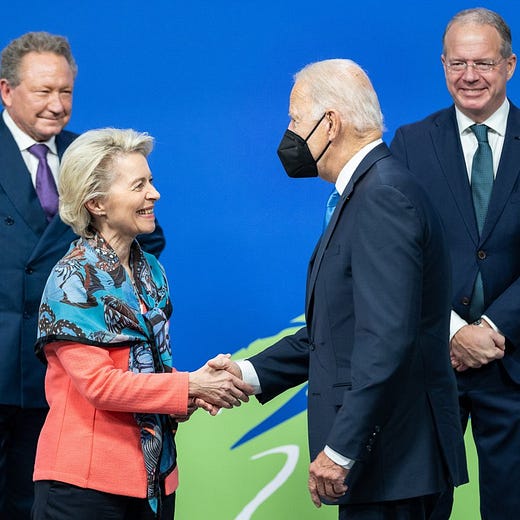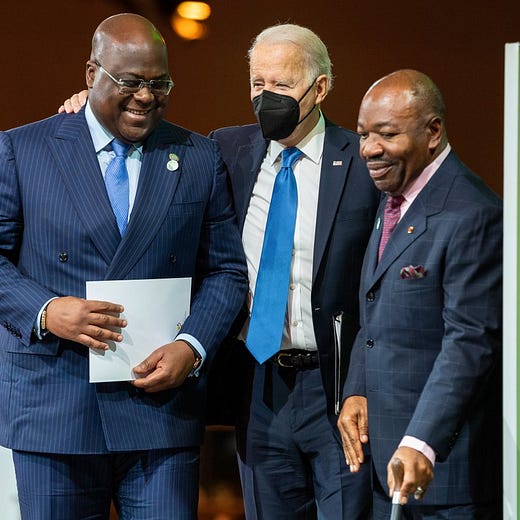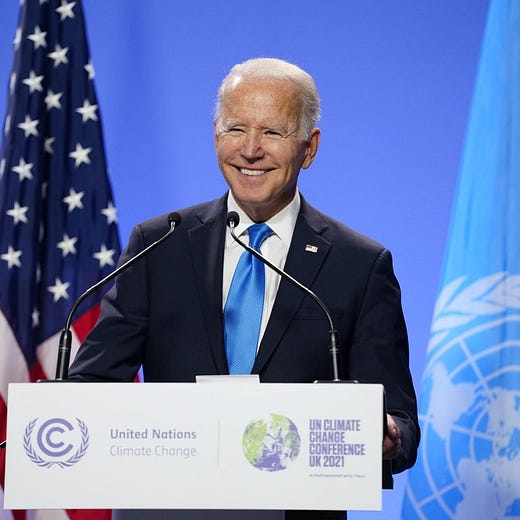This is the web version of Foreign Exchanges, but did you know you can get it delivered right to your inbox? Sign up today:
THESE DAYS IN HISTORY
November 1, 1922: The last Ottoman Sultan is deposed.
November 1, 1955: The Vietnam War begins, at least according to the US government. Even though the Viet Cong had already begun battling the South Vietnamese government and the North Vietnamese government wouldn’t officially get involved until the following year, this is the date the US government reorganized its Military Assistance Advisory Group for Indochina by country. The birth of “MAAG Vietnam” is considered by Washington to mark the start of the war, and when it lists US deaths in the war it starts the count on this date.
November 2, 1917: The Balfour Declaration is issued.
November 2, 1964: Saudi King Saud bin Abdulaziz is ousted in an internal family coup. Saud and his brother/crown prince, Faysal, had been engaged in a power struggle since their father’s death in 1953, one that Faysal really won earlier in the year when he and the rest of the ruling family stripped Saud of most of his authority and forced him to name Faysal as his regent. Saud’s mismanagement of the country, along with concerns that he was losing the “Arab Cold War” to Gamal Abdel Nasser and republicanism, led to his marginalization and ultimately removal from power. Finally in November the ruling family officially deposed Saud and made Faysal king.
INTERNATIONAL
In today’s global news:
Worldometer is tracking COVID-19 cases and fatalities.
The New York Times is tracking global vaccine distribution.
A group of 90 countries, including Brazil which is apparently a new development, unveiled an agreement to curb global methane output during Tuesday’s session of the COP26 climate summit in Glasgow. The plan calls for cutting methane emissions by 30 percent, based on a 2020 baseline, by the end of this decade. Mostly this will involve tightening emissions requirements for energy firms, since leaks from oil and gas extraction account for a substantial portion of methane emissions. But of the world’s top five emitters, only two—the United States and the aforementioned Brazil—are part of this group. The other three—China, India, and Russia—are not.
Speaking of COP26, the “world leaders give a lot of potentially meaningless speeches” portion of the summit wrapped up on Tuesday. The summit will continue for another couple of weeks with more working group-level representation. Joe Biden apparently left feeling good about the conference, for reasons I don’t entirely understand.
MIDDLE EAST
SYRIA
Syrian state media is reporting another Israeli missile attack focused somewhere in the suburbs of Damascus. The Israelis struck a target near Damascus on Saturday, but it’s unclear whether the two strikes are related. In fact pretty much everything about this strike is unclear just now, apart from the fact that it happened. Potentially we’ll have more information tomorrow.
YEMEN
The Saudi military said on Tuesday that its forces had killed more than 115 Houthi fighters over the previous 24 hours in Yemen. There is still no indication that these heavy casualties, assuming the figures are accurate, are impacting the Houthi advance on Maʾrib city, and in fact there are indications that the Yemeni military and its allies are preparing for the Houthis to besiege the city in the near future. The Houthis announced Tuesday that they’d captured two more districts in Maʾrib province, hence the siege preparations. It’s looking as though the Houthis could move against provincial oil and gas fields and try to surround the city, instead of attacking it directly.
IRAQ
Having rejected the preliminary results of last month’s parliamentary election, which showed them losing a significant number of seats, leaders of Iraq’s militia-aligned Fatah Party have now pre-rejected the results of the ongoing recount. Ironically it was their initial rejection, paired with some thinly veiled threats of violence, that convinced election officials to undertake the recount in the first place. As Musings on Iraq’s Joel Wing writes, the party didn’t do badly in terms of overall vote count. But it failed to organize properly for the election, so its overall vote count translated into a low number of seats. Now that it’s abandoned the recount the question is whether its constituent militias will turn to violence to work out their political angst.
ASIA
AFGHANISTAN
An Islamic State attack on the Sardar Mohammad Daud Khan hospital in Kabul on Tuesday left at least 25 people dead and more than 50 wounded. It’s unclear from the reporting whether that casualty count includes the attackers, who were all killed according to Afghan officials. The attackers set off two explosions at the facility before attempting to storm it, only to be (again according to Afghan officials) intercepted by security forces. IS has already claimed responsibility.
In other news, an official in Afghanistan’s ministry of education, Waheedullah Hashimi, told Reuters on Tuesday that the country’s Taliban rulers still intend to reopen secondary education to girls. Indeed, Hashimi seemed in his interview to suggest that any international actors who are interested in seeing girls education continue in Afghanistan should maybe think about ponying up some cash to help make it happen. This isn’t a bad angle to take for a government that’s desperate for foreign aid, but those international actors are conditioning their aid in part on whether the Taliban allows girls to go back to school. For the Taliban to condition allowing girls to go back to school on the receipt of aid would create an impasse in which the real losers would be Afghan girls.
Speaking of the Taliban’s financial crisis, the group has now reportedly banned the use of foreign currency. Obliging Afghans to carry out transactions in afghanis might have some marginal impact on the country’s currency reserves but nowhere near enough to seriously matter. On the plus side, perhaps, the Pakistani government on Tuesday reopened a major commercial crossing along the Afghan-Pakistani border, at Chaman. The Pakistanis had shut Chaman weeks ago over the security situation in Afghanistan and have left it shut amid a number of disputes with the Taliban.
PAKISTAN
At least 13 people were wounded by a roadside bomb in Pakistan’s Baluchistan province on Tuesday. The intended target appears to have been a nearby police vehicle but it’s unclear how many of the casualties were security personnel and how many were civilians. There’s no indication as to responsibility.
Some details of the Pakistani government’s deal with the Islamist Tehreek-e-Labbaik Pakistan group have emerged. In return for an end to TLP’s recent march on Islamabad, authorities have reportedly agreed to release some 2000 of the group’s members who were in government custody and to allow it to operate legally again. This means that TLP can openly contest elections, among other things. It’s unclear whether TLP leader Saad Rizvi is among those who will be released but that seems like a reasonable guess.
CHINA
If it seems to you like COP26 is turning into a bit of a China-bashing conference, you’re not wrong:
Joe Biden launched a stinging attack on China on Tuesday for the failure of the country’s president, Xi Jinping, to show up to the Cop26 UN climate summit, and failing to show leadership on the climate crisis.
The US president said it was a “big mistake” that his Chinese counterpart had chosen not to attend the summit, where more than 120 world leaders have spent the last two days discussing ways to limit global temperature rises to 1.5C.
“We showed up,” Biden told a press conference, speaking before world leaders departed, to leave the floor to their ministers and officials for two weeks of tense negotiations.
“They didn’t show up … It is a gigantic issue and they just walked away,” he said, also criticising Russia and Vladimir Putin.
“How do you do that and claim to have any leadership mantle?”
Biden’s airing of the grievances (well, grievance) aside, if you could siphon carbon out of the atmosphere simply by criticizing Beijing, this conference would be doing fantastic work on humanity’s behalf. This criticism is fueled by a Chinese emissions reduction plan that is, in truth, inadequate to the crisis. It doesn’t phase out coal fast enough, it doesn’t commit to “net zero” emissions (for whatever that dubious concept is actually worth) soon enough, etc.
China occupies a somewhat unique place in the global economy and on this specific issue. In the aggregate it’s quite wealthy and is the world’s largest carbon emitter. At the per capita level, it’s arguably still a developing nation and its emissions lag well behind the US and other developed (and some not so developed) states. The head of the Chinese delegation, Xie Zhenhua, stressed that point on Tuesday in remarks in which he lambasted developed (Western) nations for causing this crisis and for refusing to pony up the level of international aid necessary to help developing nations transition to zero emission energy sources. He also argued that China’s “developing” status should give it some leeway in terms of, e.g., phasing out coal.
AFRICA
NIGERIA
Unspecified gunmen abducted four staff members and two children from the campus of the University of Abuja overnight. There’s no indication as to responsibility but the abduction is obviously similar to the spate of mass kidnappings that have struck school campuses across northern Nigeria in recent months. What makes this attack unusual is that it took place in the Nigerian capital, somewhat outside the geographic range of those prior incidents.
CHAD
Chad’s ruling junta has apparently made some progress in talks with some of the country’s largest rebel groups about including them in a political transition process. A “special technical committee” established in August has held negotiations with leaders of those groups and has secured tentative interest from the Union of Forces of Resistance rebel alliance and the Front for Change and Concord in Chad. Both organizations have demands in return for their participating in the transition, including prisoner releases and greater tolerance by Chadian authorities for political protests. The junta, led by former President Idriss Déby’s son, Mahamat, took power when the elder Déby was killed in battle in April and says it plans to shepherd the country through new elections.
CENTRAL AFRICAN REPUBLIC
The Central African presidential guard opened fire on a bus containing a unit of Egyptian UN peacekeepers in Bangui on Tuesday, wounding at least ten of them. Fleeing the attack, the bus reportedly struck and killed one civilian. It’s unclear why the guards fired on the bus but the UN characterized the incident as “a deliberate and unspeakable attack” in a statement.
ETHIOPIA
It’s been a hallmark of the ongoing Ethiopian civil war that news has been difficult to come by and almost impossible to verify. But circumstantial proof that the rebel Tigray People’s Liberation Front did indeed make major advances toward Addis Ababa over the weekend emerged on Tuesday. Not only did the Ethiopian government declare a six-month state of emergency, not exactly the sort of decision one takes when everything is going well, but authorities in the capital reportedly began registering private firearms and organizing city residents into potential militia units. The TPLF’s weekend successes left it around 380 kilometers from Addis Ababa, but the group now controls part of the major highway that heads into the city from the north and east. So depending on how much resistance it faces from Ethiopian forces, the TPLF could march on the city relatively quickly.
EUROPE
ROMANIA
Would-be Romanian prime minister Nicolae Ciucă and his Liberal Party have decided to withdraw his candidacy for that office and avoid a parliamentary confidence vote that he was widely expected to lose. This doesn’t do much to alter Romania’s burgeoning political crisis but for Ciucă it avoids some embarrassment. President Klaus Iohannis is expected to meet with party leaders this week and should designate yet another prospective PM within a few days.
CZECHIA
The political news is a bit more positive in Czechia, where the five party coalition that emerged in the wake of last month’s parliamentary election has reportedly come to an agreement on the structure and agenda for its forthcoming government. The parties had already coalesced into two alliances prior to the election and had agreed in principle to form a government together if the election worked out that way. They’ll be led by Petr Fiala of the conservative Civic Democratic Party, though when exactly Fiala should expect to become prime minister is an open question. Czech President Miloš Zeman is still in the hospital under murky circumstances, and therefore is unable to formally designate Fiala as PM.
AMERICAS
UNITED STATES
Finally, for a little change of pace I’ll leave you with Kelsey Atherton’s thoughts, courtesy of this week’s Discontents newsletter, on what the latest adaptation of Dune has to say about the state of American Empire:
Frank Herbert conceived his universe of great power struggle, imperial decay, resource war, and limitless psychedelics from a moment that must have felt like peak American power. Published in 1965, the novel acknowledges the Cold War around it by spelling out the role of nuclear arsenals as primarily constraining the scale of violence between the great houses. (The weapons are as best I recall unmentioned in the 2021 film).
Not counting Jadorowsky’s famously ill-fated attempt, the two durable live-action adaptations each arrived at subsequent peaks of American power. David Lynch's 1984 cinematic version and the Sci-Fi channel's 2000 television miniseries hit when Imperial Decline was a thing that happened to other countries, leaving only inevitable End-of-History victor the United States still standing. Against that backdrop, it's easy to read Dune as not a commentary on Lawrence of Arabia (cinematic release, 1962) but a reflection of it, a variation on the familiar form of imperial saviors bending locals to their whim with ultimately unfulfilled promises.
If Dune resonates in 2021, it does so because the collapse of institutions within empire has never been clearer. Duke Leto Atreides, ill-fated father of protagonist Paul, rises to foreign occupation in the name of duty, one that may eventually pay off with future wealth. His charisma, central to the casting of Oscar Isaac in the role, is an asset in the Landsraad, the sclerotic deliberative body of galactic governance, and while there's no on-screen evidence of him marshaling a coalition to power, the mere possibility is enough to mark him and his entire line for an elaborating orchestrated death.
Coup-proofing against energetic leadership isn't a new story, yet it feels prescient. The old world is dying, and is doing monstrous things to keep the new world from being born.






